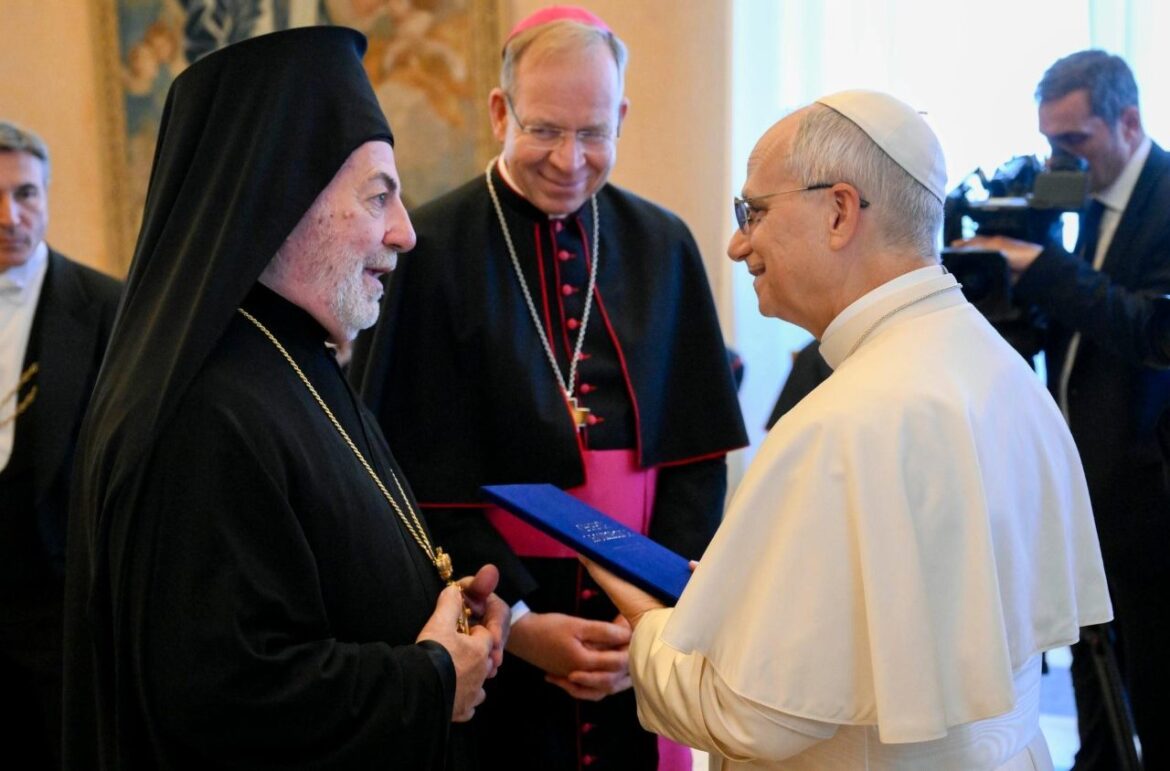
The day after signing the updated Charta Oecumenica, the Presidents of the Council of European Bishops’ Conferences (CCEE) and the Conference of European Churches (CEC) speak with Vatican News about the significance of the ecumenical gesture and how it follows Pope Leo’s call to work toward peace together in today’s broken world.
By Deborah Castellano Lubov
The Joint Committee of the Council of European Bishops’ Conferences (CCEE) and the Conference of European Churches (CEC) met in Rome, 4 -6 Nov. 2025, for the signing on Wednesday of the updated Charta Œcumenica in the Church of the Martyrdom of Saint Paul at the Abbey of the Three Fountains in the south of Rome. The gesture reiterated the common commitment of the European Churches to unity, dialogue, and cooperation.
The following morning, Pope Leo XIV received the Committee in a special Audience.
Charta Œcumenica
Signed in 2001 by the Presidents of CCEE and CEC, the Charta Oecumenica has been a milestone of European ecumenical cooperation for over two decades. The revised version seeks to address contemporary challenges and reflect the changing realities of European society and Christianity.
The text’s review process, which began in 2022, was led by a joint CCEE-CEC working group, while contributions from Churches and ecumenical organisations from across Europe were carefully considered to ensure that the updated text is in line with current ecumenical needs. The collaborative effort aimed to produce a document that promotes unity, peace and joint action among the Churches in Europe.
Archbishop Gintaras Grušas, CCEE President and the Archbishop of Vilnius; and CEC President, Greek Orthodox Archbishop Nikitas of Thyateira and Great Britain, were the signatories of the updated version and spoke to Vatican News following their encounter with the Holy Father.
Joint witness of Christianity
Archbishop Grušas reflected on the significance of presenting the updated Charta to Pope Leo and called their time together “a blessing.”
“It’s not a theological note, but it is a joint statement,” he clarified, “of how we as Christians, both Catholic and the rest of the Christians in Europe, see our joint witness of Christianity, which stems from listening to God’s Word and stems from our baptism, which we all commonly share, but also to address the issues of today’s Europe.”
The CCEE President explained that the document needed to be updated for how “Europe has changed in the last 25 years,” “be it because of the migration issues, be it because of the change requiring the safeguarding of Creation, the need for our attention toward the safeguarding of creation, be it to the change in technologies and artificial intelligence, which also needs to be addressed from a Christian perspective.”
He pointed out that document also addresses the situation of young people, highlighting “the growing witness of young people coming back to the Church in various countries throughout Europe.” “So there are new challenges,” Archbishop Grušas stated, “but also great perspectives and opportunities.”
Witness the Gospel, especially amid war and suffering
He observed that their signing that document reaffirms their objective of “taking on the challenge to continue the evangelization and witness in Europe today at a place where much started,” citing the martyrdom of Saint Paul, who “through the shedding of his blood, brought the Gospel to Europe.”
“We continue,” he insisted, “that desire to continue to witness the Gospel.”
One of the sections of the document, Archbishop Grušas explained, is focused on migration and welcoming the migrant, the foreigner.
In this context, he recalled the massive numbers of migrants provoked by the war in Ukraine, including both internally displaced persons and emigrants.
“The Churches,” he said, “have done a great job of helping all these people.” In this sense, the Archbishop remembered how Pope Leo encouraged them to continue these “acts and works of mercy” which are “a great witness of our Christian faith.”
“The Holy Father really did encourage us to continue,” the CCEE President explained. “He cited the difficulties that we sometimes face in the ecumenical journey and mentioned our synodal journey was ecumenical and that ecumenism is synodal.” “And we sense that,” he reflected, “because it was really a work together of listening and responding to where the Spirit prompted us.”
‘Walls of separation have come tumbling down’
Meanwhile, Archbishop Nikitas likewise reflected on presenting the Charta to the Pope with Archbishop Grušas.
“It was an honor, a privilege, and a blessing,” he noted, “to be, at this point in history and in time, able to give the Pope a message of hope, showing that we can work together and we can achieve things.”
“It shows,” the President of the Conference of European Churches marveled, that “we’ve come overcome differences of the past.”
“Those walls of separation have come tumbling down,” he said, stating, “We now work together. We speak the same language, the language of Christ, the language of love.” The Greek Orthodox Archbishop shared that he also greeted the Pope as a fellow American, who used to live in Chicago, and told him they will see one another during the Holy Father’s upcoming Apostolic Journey to Türkiye.
Archbishop Nikitas, like Archbishop Grušas, reiterated the important role of Christians working together toward peace in today’s fractured world.
Proposal to spend less on arms, and more on helping humanity
Asking how Christians can make the world a better place, the CEC President proposed, “Perhaps we should consider spending more not on nuclear arms and other things, but on finding results to cure the diseases, the problems feeding humanity.”
“Look what happened just recently in Jamaica. What’s happening in the Philippines… Look at the Holy Land, Palestine, Gaza. People are suffering,” he continued, insisting, “We’re called to give answers to their challenges and problems.”
The Greek Orthodox Archbishop stressed how Pope Leo’s “strong message” about promoting peace resonated with those gathered.
“We need people, especially the Holy Father, to speak out,” Archbishop Nikitas stated, adding, “When the Holy Father speaks, the world listens, and that’s critical.”

